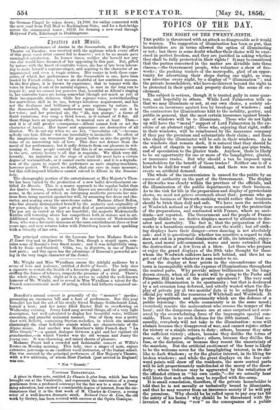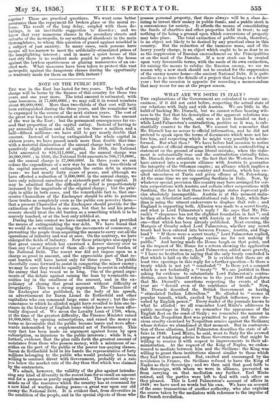TOPICS OF THE DAY.
THE NIGHT OF THE TWENTY-NINTH.
Tint public is threatened with an attack as disagreeable as it would be wanton. The suggestion of illumination has been so put, that householders are in terms allowed the option of illuminating or not; but there is some doubt whether their choice will be exer- cised in perfect freedom, and they are justified in asking whether they shell be fully protected in their rights ? It may be considered that the parties concerned in the matter are divisible into three classes,—the Government people, who volunteer a show of fire- works ; the pushing traders of the metropolis, glad of an oppor- tunity for advertising. their shops during one night, as some now advertise every night, by a display of ' illumination" ; and the private householders, who have no interest beyond the right to be protected in their quiet and property during the scene of ex- citement.
The subject is serious, though it is treated gaily in some quar- ters, and hopefully in Others. While Lord Palmerston tells us that we may illuminate or not, at our own choice, a society ad- vertises an insurance against loss by breakage of windows ; and the contractors for illuminations hint to the nobility, gentry, and public in general, that the most certain insurance against break- age of windows will be to illuminate. Those who do not light up will have the " moral " support of Lord Palmerston in the ex- ercise of an abstract right ; those who, enjoying that right, suffer in their windows, will be reimbursed by the insurance company if they pay the premium and substantiate their claim ; and those who employ the illuminator will be safe in their windows. As to the windows that remain dark, it is natural that they should be an object of chagrin to persons in the lamp and gas-pipe trade, and of speculation to the glazier trade. Anyhow, there is likely to be an opportunity for one or more of the lamplighter, glazier, or insurance trades. But why should a tax be imposed upon householders for the benefit of those trades ? Neither one is of a kind to be dull for want of demand, and there was no need to create an artificial demand.
The whole of the inconvenience is caused for the public by an excess of authority on the part of the Government. The display of fireworks was clearly, within the province of the officials, and the illumination of the public departments was their business. As to the risk for life in the preparation and display of pyrotechnic shows, we need not grieve overmuch about that: persons who go into the business of firework-making would rather that business should be brisk than dull and safe. We have seen the accidents at Woolwich noticed as if they were occasioned by the protraction of the preparations, and contrasted with France, where no acci- dents—are reported. The Government and the people of France equally dislike to see festive displays marred by allusions to dis- aster and mortality. The fact is, that the preparation of fire- works is a hazardous occupation all over the world ; but all sta.- lug displays have their danger—even dancing is not absolutely . safe; and it is questionable whether too sensitive a regard to risk does not end in. a practical diminution of life, its intensity, enjoy- ment, and moral self-command, worse and more extended than the destruction of a few lives at a blow. Let those who prepare or enjoy the grand displays of the 29th take thought for those whom the Woolwich sufferers have left behind, and then let us get out of the show whatever it can render to us. But the display at four points in the circumference of the town is incompatible with the expense of illuminations throughout the central parts. Why provide minor brilliancies in the long-, drawn streets, when all the world will be going to the Parks and Primrose Hill to look at the greater splendours ? The very soul of a public illumination is its spontaneity ; but that is destroyed by a set occasion long deferred, and utterly wasted when the dis- play of private joy at two months' date is to be eclipsed by the official joy with all the resources of Whitehall and Woolwich. It is the promptitude and spontaneity which are the defence of a public rejoicing: the whole community is in the same mood; everybody, resents the malecontent who crosses the temper of the hour; and the dangerous classes are at once surprised and over- awed by the overwhelming force of the impromptu special con- stable. There is no such defence for the 29th instant. Most as- suredly, everybody will not take to the illumination. seine will abstain because they disapproved of war, and cannot rejoice either for victory or a simple return to duty ; others, because they miss the sufficient victory; others, because they dislike the terms of or the peace altogether ; others, because they diR1 ike the pace, or the dictation, or because they resent the uncertainty of the mandate. But the artificial excitement of the hour is likely to be the welcome cover for the lamplighting interest, in its dis- like to dark Nbindows ; or for the glazier interest, in its liking for broken windows ; and while the great displays on the four out- ward points will draw off the residents, the more central parts will be left proportionately undefended at the mercy of the disor- derly • whose violence may be aggravated by the retaliation of the offended citizen in " his own castle,"—for we actually hear wild hints that mob attack may be repelled with fire-arms. It is small consolation, therefore, if the private householder is told that he is not morally or technically bound to illuminate, and that he may recover from an insurance society if he will pay the premium. Why should he be called upon to pay any tax for the safety of his house ? why should he be threatened with the invasion of a flaring " row " as the consequence of a publio
caprice? These are practical questions. We want some better assurance than the repayment for broken glass or the moral re- lease. The result of the long delay, coupled with these de- batings, is an inevitable suggestion to disorder ; and we know that very numerous classes in the secondary streets and suburbs of the metropolis, to say nothing of dissidents in the main thoroughfares, to whom this question of guard against mischief is a subject of just anxiety. In many eases, such persona have means all too narrow to meet the artificially-stimulated prices of the lamplighting interest ; and in many a quiet house of this vast city there is no resident male guard to protect the house against the lawless sportiveness or glazing manoeuvres of an ex- cited mob. What measures have been taken to protect this vast metropolis against the dangerous classes during the opportunity so wantonly made for them on the 29th instant ?



































 Previous page
Previous page